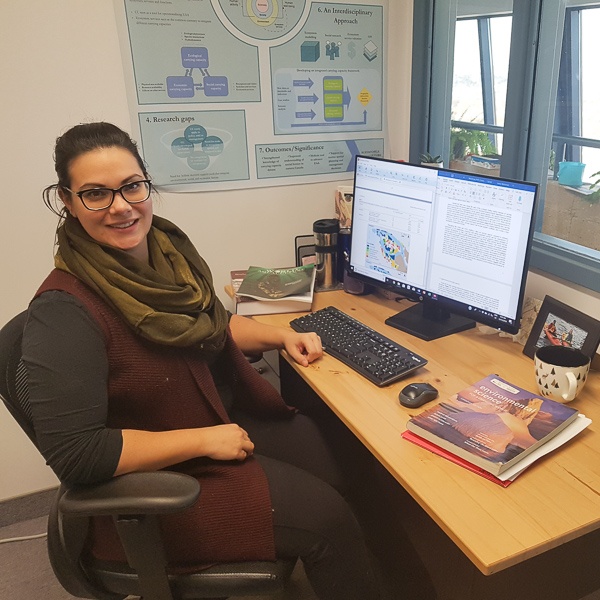Aquaculture Ambassador: Jenny Weitzman
“The single greatest message I want to spread is that there is a way that aquaculture can be both economically secure, societally endorsed, and environmentally responsible,” Jenny Weitzman, Council of Emerging Leaders in Aquaculture.
By Samantha McLeod
SeaWestNews
Aquaculture in Canada today generates $5.16 billion in economic activity and employs over 25,000 people. As one of the fastest growing food sectors in the world, the industry in Canada has a younger-than-average domestic workforce with two-thirds of all employees under the age of 35. Our new series, Aquaculture Ambassador, is about 14 Canadians who have come together to showcase the growing presence of young people in the sustainable future of farming the oceans. In this segment, we talk to Jenny Weitzman, Interdisciplinary PhD candidate at Dalhousie University Halifax, Nova Scotia.
Tell us a little bit about yourself?
I am currently an Interdisciplinary PhD candidate at Dalhousie University in Halifax, Nova Scotia. While I grew up in downtown Ottawa, I have always been drawn to the ocean. I moved to Halifax in 2009 where I completed my B.Sc. in Marine Biology and Oceanography at Dalhousie University. Since then I fell in love with the coastal landscape, culture, and people of Atlantic Canada. I began to appreciate the deep connection to our ocean resources, and the complexities of how we manage our oceans for the future. This convinced me to stay in Nova Scotia and complete my Masters of Marine Management at Dalhousie University.
What drew you to aquaculture?
Eating seafood has always been one of my great loves in life. When I first got interested in environmental management, I was fascinated by the degree of disconnect between how our seafood systems are managed, and the public’s understanding and knowledge. Aquaculture, which presents incredible opportunities and benefits, seems to be wrapped up in a controversy of environmental concerns and societal conflict.
I never wanted my research to remain cooped up within the bowels of academic libraries. I hope to see my research look at current challenges and offer potential solutions. I want my work to be policy-relevant to make changes and create benefits for Canadian people and economy, while respecting the natural environment. With such a fast-growing and exciting industry, research in aquaculture is always changing, always exciting, and gets me to ask new questions every day. I am constantly excited by how diverse the industry is; if there is something you want to do, aquaculture has it.
What’s your average day in aquaculture like?
As a typical PhD student, my average day is spent reading and writing. When I begin my field work, I will be travelling around Atlantic Canada and speaking to communities, scientists, industry, and government to understand the most desired and appropriate processes and factors for sustainable aquaculture decision-making and determine the local drivers that influence both growth and conflict to salmon aquaculture development.
I am also continuously involved with activities conducted through Dalhousie’s Public Scholar program, with the goal to communicate my research and outreach for sustainable seafood to the broad public.
How do you plan to change the current narrative about aquaculture, in particular salmon farming in Canada, from conflict to conversations about sustainability?
The single greatest message I want to spread is that there is a way that aquaculture can be both economically secure, societally endorsed, and environmentally responsible. I want to change the conversation so that people are not questioning whether we should, but are focused on how we should. As a scientist, I hope to show the public all the amazing research and work being done across universities, government agencies, non-governmental organizations and within companies all aimed towards improving the sustainability of aquaculture. Through my own PhD research, I seek to help build a holistic approach to salmon aquaculture management in Atlantic Canada that embraces a balance of social, economic, and environmental goals through multi-disciplinary approaches and multi-stakeholder collaboration.
What is the single biggest project you are working on right now?
My PhD research seeks to build an integrative framework for carrying capacity to help decision-making that respects the limits of the ecological, social, and economic environment. This includes identifying the most relevant and suitable carrying capacity factors and indicators, as well as testing tools and approaches to determine appropriate limits and criteria. This project is imbedded within the Ocean Frontier Institute’s module on Social Licence and Planning in Coastal communities, which seeks to understand societal perceptions of aquaculture and guide the sector towards societally-endorsed sustainable aquaculture. This work seeks to test the tools and approaches for holistic decision-making to help operationalize Ecosystem Based Management of aquaculture and a support a multidisciplinary approach to Marine Spatial Planning.
RELATED LINKS:
Aquaculture Ambassador: Kathleen Allen
Aquaculture Ambassador: John B. Relyea-Voss
Aquaculture Ambassador: R.J. Taylor

